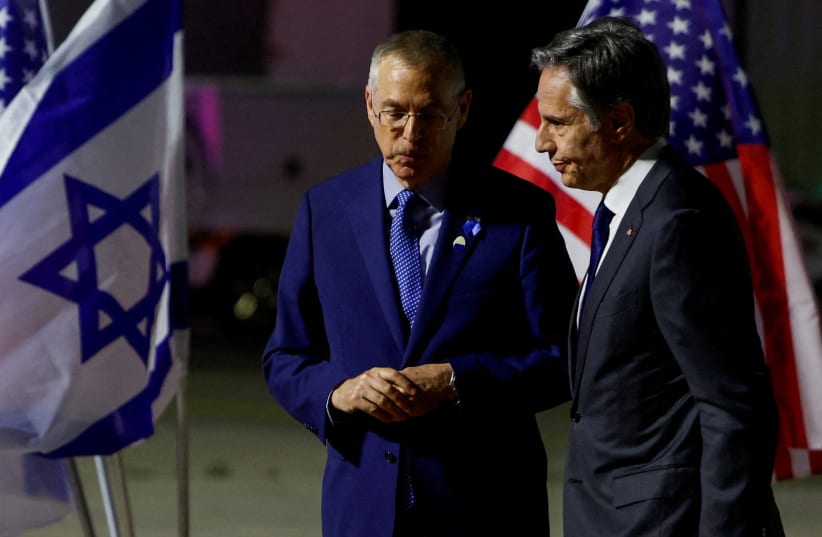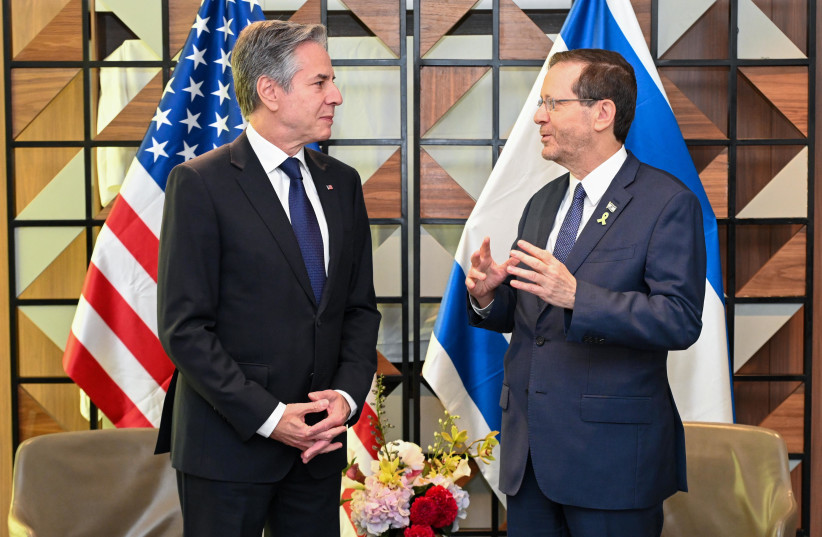US Secretary of State Antony Blinken opposes IDF operation in Rafah, emphasizing a need for civilian protection. Efforts continue for a hostage deal amidst escalating tensions.
TOVAH LAZAROFF MAY 1, 2024 15:30
Updated: MAY 1, 2024 23:37

US Secretary of State Antony Blinken stressed his opposition to an IDF operation in Rafah and the significance of a hostage deal while visiting the Jewish state as he and Israeli officials waited to receive an answer from Hamas to the latest proposal.
“We will not support a major military operation in Rafah. Absent an effective plan to make sure that civilians are not harmed,” Blinken said as he spoke briefly with reporters at the port in Ashdod, near Gaza.
During the day, he met with Prime Minister Benjamin Netanyahu, Defense Minister Yoav Gallant, and members of the war cabinet, including Ministers Benny Gantz and Gadi Eisenkot.
But as he stood in Ashdod, he told reporters, he had “not seen” a viable IDF plan to enter Rafah to destroy the Hamas battalions there that offered sufficient protection for the civilian population.
He said the Biden administration believes that “there are other ways … better ways of dealing with the real ongoing challenge of Hamas that do not involve a major military operation in Rafah.”
Before Blinken’s arrival, Netanyahu clarified that the IDF would enter Rafah, irrespective of whether there was a deal.
Israel has believed that a Rafah operation is a vital pressure lever to sway Hamas to make a deal to release the remaining 133 hostages. Still, it also fits in with the overall belief in Israel that the terror group must be ousted from the enclave.
Israel’s political struggle

Some of Netanyahu’s coalition partners have warned they will collapse his government if he does not enter Rafah.
The US has preferred to see a hostage deal that pauses the war and leads to a permanent ceasefire. It is concerned by the continual international and domestic backlash against Israel over the Gaza war, and it is also worried that the protracted conflict has complicated its efforts to work out a defense pact with Saudi Arabia.
Hamas’s instance that any deal must include an end to the war has been one of the sticking points in the agreement.
Blinken met with Netanyahu for over two hours on Wednesday, with media reports out of conversation stating that the Prime Minister had insisted that he must conduct a Rafah operation.
When pressed about Netanyahu’s position on Rafah, Blinken stressed that “we discussed today, among other things, getting this agreement, which involves an immediate ceasefire, hostages home, and then working to build on it.
“Let’s see if we can if we can get this done. But I think this is something that the whole world is watching. And if Hamas purports to care about the Palestinian people and wants to see an immediate alleviation of their suffering, it will. It will take the deal. If it doesn’t, I think that’s further proof that it doesn’t care a bit about the Palestinian people,” Blinken said.
Earlier in the day, he paused to speak with protestors outside his hotel, who waved American and Israeli flags and demanded a hostage deal.
“Bringing your loved ones home is at the heart of everything we’re trying to do, and we will not rest until everyone – man, woman, soldier, civilian, young, old – is back home,” Blinken said.
“We will not rest; we will not stop until you’re reunited with your loved ones,” Blinken said.
“So please keep strong, keep the faith. We will be with you every day until we get this done,” he stressed.
Earlier in the day, the Lebanese news site al-Akhbar published details of what it claimed was an outline of a three-phase plan presented to Hamas by Egypt, which, along with Qatar, is mediating a deal with the help of the US.
Thirty-three hostages would be freed during the first phase, which would last for 40 days: children under the age of 19, women civilians and soldiers, those over 50, and the sick and wounded.
Israel would free Palestinian prisoners jailed on security and terror-related charges, with the numerous varying.
For every female Israeli soldier released, Israel would release 40 Palestinian prisoners, of which 20 are serving life sentences and 20 whose remaining sentence is less than ten years. Those serving life seances would be freed to Gaza or exiled abroad.
In exchange for each elderly captive, Israel would free 20 elderly Palestinian prisoners who have less than ten years left to serve. Twenty Palestinian minors and female prisoners would be free for every Israeli woman and child held in captivity.
Hamas would free three hostages on the first day of the agreement and continue to do so every three days, starting with all the women.
The deal would include a temporary ceasefire, with the IDF withdrawing from populated sections of Gaza to areas closer to the border. This includes leaving the Netzarim corridor by the 22nd day. Displaced Palestinians would also be allowed to return home.
The remainder of the hostages would be accessible in the second phase, which would last 42 days. Those hostages that are deceased would be sent back to Israel during the last phase, which would cover another 42 period.
The agreement also called for the daily entry of 500 trucks of goods into Gaza, including 50 for fuel.
The issue of increasing the humanitarian assistance to Gaza, was one of the important elements of Blinken’s trip, which was his seventh regional trip that included Israel, since the start of the war on October 7. He arrived after visiting Saudi Arabia and Jordan.
“We have seen in recent weeks real, meaningful progress” in the increase of humanitarian assistance into Gaza, Blinken stated.
He noted that trucks with assistance from Jordan entered northern Gaza through the Erez crossing, which opened for the first time on Wednesday.
The crossing, which had been a pedestrian one, was closed after it was damaged by the Hamas attack on October 7. Israel had promised the US it would reopen it.
The opening of Erez, Blinken was the “result of a very important collaboration involving Israel,” Jordan, and the UN, he stated.
The US is also constructing a temporary pier on the Gaza coast for cargo ships to arrive from Cyprus, which Blinken said was a week away from opening.
He noted that he was in Ashdod because its port was also used as a transit option for cargo heading to Gaza. Earlier in the day he visited the Kerem Shalom Crossing, which is the main commercial passage into Gaza together with Gallant. They also toured Kibbutz Nir Oz, which was one of the communities Hamas attacked on October 7
“The progress is real, but given the immense need in Gaza, it needs to be accelerated,” he said.
But one of the challenges is making sure that the assistance is properly distributed and “that it’s not interfered with or impeded by Hamas,” Blinken said.
Gallant emphasized to Blinken that Israel was fighting Hamas and not the Palestinian civilians.
“We will facilitate the delivery of humanitarian aid. At the same time … I would like to emphasize – that this war was started by Hamas, a brutal terrorist organization that is located [mere] meters from the border of Israel, as a proxy of Iran.
“We are determined to destroy the Hamas organization and to bring the hostages back to their families,” Gallant stated.
Content retrieved from: https://www.jpost.com/breaking-news/article-799403.